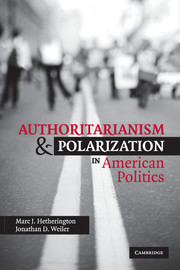Book contents
- Frontmatter
- Contents
- Acknowledgments
- 1 Spanking or Time Out: A Clash of Worldviews?
- 2 Putting Polarization in Perspective
- 3 Authoritarianism and Nonauthoritarianism: Concepts and Measures
- 4 A Historical Account of the Roots of Worldview Evolution
- 5 Authoritarianism's Structuring of Contemporary Issues
- 6 Threat and Authoritarianism: Polarization or Convergence
- 7 Evidence of Worldview Evolution
- 8 Immigration: A Reinforcing Cleavage that Now Constrains the Republican Party (GOP)
- 9 What the 2008 Democratic Nomination Struggle Reveals about Party Polarization
- 10 A New View of Polarization
- Epilogue
- Bibliography
- Index
7 - Evidence of Worldview Evolution
Published online by Cambridge University Press: 05 June 2012
- Frontmatter
- Contents
- Acknowledgments
- 1 Spanking or Time Out: A Clash of Worldviews?
- 2 Putting Polarization in Perspective
- 3 Authoritarianism and Nonauthoritarianism: Concepts and Measures
- 4 A Historical Account of the Roots of Worldview Evolution
- 5 Authoritarianism's Structuring of Contemporary Issues
- 6 Threat and Authoritarianism: Polarization or Convergence
- 7 Evidence of Worldview Evolution
- 8 Immigration: A Reinforcing Cleavage that Now Constrains the Republican Party (GOP)
- 9 What the 2008 Democratic Nomination Struggle Reveals about Party Polarization
- 10 A New View of Polarization
- Epilogue
- Bibliography
- Index
Summary
On May 15, 2007, a crowded field of Republican presidential hopefuls gathered in South Carolina for the second in a series of debates. An all-Republican affair roughly eight months before the first primary contest should attract only the most committed and ideologically extreme people. Although ideologically unrepresentative, this base is critically important, since candidates have to appeal to it first to gain the nomination. After the nomination is secure, candidates can tack their way back toward the middle where the swing voters, who decide elections, tend to reside.
Candidates, armed with polls and consultants, calibrate their responses to capitalize on the opinion environment. The audience reaction to these responses during the debates can provide a window on activist opinion. Several exchanges suggested that authoritarian-themed rhetoric resonated well with the Republican base. The clearest indications occurred when moderator Brit Hume asked candidates how they would respond to the following hypothetical scenario:
HUME: “The questions in this round will be premised on a fictional, but we think plausible scenario involving terrorism and the response to it. Here is the premise: Three shopping centers near major U.S. cities have been hit by suicide bombers. Hundreds are dead, thousands injured. A fourth attack has been averted when the attackers were captured off the Florida coast and taken to Guantanamo Bay, where they are being questioned. U.S. intelligence believes that another larger attack is planned and could come at any time.
- Type
- Chapter
- Information
- Authoritarianism and Polarization in American Politics , pp. 134 - 159Publisher: Cambridge University PressPrint publication year: 2009



